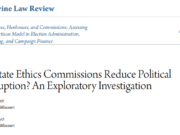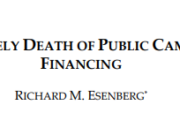The Federal Election Commission administers and enforces federal election laws. But campaign finance reformers have argued for years that the FEC does little to stem the exploitation of “loopholes” in election law. This article evaluates the enforcement actions of the regulatory body by exploiting a unique database of legal complaints moderated by the FEC since 1996. The author has coded over 700 complaints on a variety of dimensions, including the issue focus, the characteristics of the complainant and respondent, and the final penalty levied by the Commission. Among the patterns he finds are that regulatory votes are rarely split along partisan lines and that Commissioners levy (some quite substantial) fines in about 30 percent of all enforcement cases. The major theoretical question of this paper is whether the FEC punishes potential violators of election law in a partisan manner, whether they are biased toward candidates, and whether certain structural changes at the FEC influence performance. The evidence suggests an FEC (increasingly) more functional than many often claim, with no slam-dunk patterns suggestive of large-scale bias.














